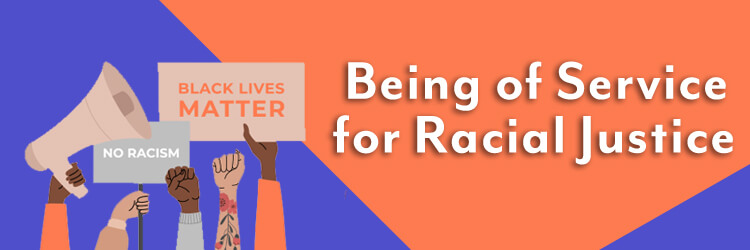[vc_row][vc_column][vc_column_text]Being of service is an important part of recovery. There is a lot of information circulating about how to help in the fight for racial justice, but eventually this might slow down. Dedicating your time, energy and resources to supporting racial equity—even when it’s no longer making headlines—is one of the most important ways to be of service. People’s lives are at stake.
I want to give a big caveat that I am a white person making suggestions meant mostly for non-Black folks (but that Black people are welcome to use as well). I am by no means an expert on what is most helpful. I make recommendations based on advice from Black people I’ve read in books, listened to on podcasts, or seen on social media. I suggest things I myself have been doing, based on those things I’ve read, listened to and seen. But this is by no means an exhaustive list.
Don’t ask your Black friends to educate you—many Black people are asked to do this often and it takes a lot of emotional energy. But when Black folks in your life speak about what they need, listen. Seek out information that Black people have already taken energy to put into the world instead of asking a Black person you know. Google is your friend. At the end of this post, I will share some resources.
If you have the means, start a recurring donation to at least one local and one national organization. I’ve worked at non-profits and have learned the importance of recurring donations. They are a sustained way to support an organization, even if you can’t give a ton.
There are so many organizations to choose from. The local one I chose was Baltimore Safe Haven, a non-profit that helps improve quality of life for transgender people in Baltimore. While this may not seem directly related, the organization is led by a Black transgender woman and many of its clients are also Black transgender women—a group that is disproportionately murdered, denied jobs and housing, and not always fought for when the world at large is protesting racial injustice.
Donations aren’t the only way to help financially. Think about where you typically spend your money and how that can go to a Black-owned business. For instance, I spend a lot of my money on food and books. I’ve recently started making a conscious decision—prompted by Black activists who talked about the importance of doing so—to support Black-owned restaurants and bookstores. People have talked about “redistributing wealth” in this way.
Speaking of books: read! Or if reading isn’t your medium, listen to podcasts. You can’t fight a problem you don’t understand. Seek out resources about systemic racism, as well as personal accounts of Black people’s experiences. For podcasts, I would suggest Code Switch, Still Processing, Between Sessions, and Ear Hustle (this is about life in prison, but as Black people and People of Color are disproportionately incarcerated, it’s relevant).
I have literally endless recommendations of incredible books by Black folks, but some specifically about the experience of being Black in America are: Invisible Man, Got the Whole World Watching by Mychal Denzel Smith, When They Call You a Terrorist: A Black Lives Matter Memoir by Patrisse Khan-Cullors and asha bandela, How to be an Antiracist by Ibram X Kendi, How We Fight for Our Lives by Saeed Jones, Looking for Lorraine by Imani Perry, We Speak for Ourselves by D. Watkins, Tears We Cannot Stop: A Sermon to White America by Michael Eric Dyson, Thick by Tressie McMillan Cottom, Heavy: an American Memoir by Kiese Laymon, and The Beautiful Struggle by Ta-Nehisi Coates.
You can also check your social media follow lists and see if you’re only hearing white voices. As I mentioned earlier, Black people spend their emotional energy putting stuff out there. Find it and read it.
Some Instagram accounts to follow are @sonyareneetaylor, @adriennemareebrown, @organizingblack, @melaninandmentalhealth, @blklivesmatter, @blackvisionscollective, @mvmnt4blacklives, and so many more. As you follow accounts, you will see who they are following and sharing.
Share these resources with non-Black people in your life. Talk to your family and white friends about race and racism. It might be uncomfortable. The only way to become more comfortable with it is to practice by starting now. These conversations are important and overdue.
Those of us in recovery have the advantage of a clear mind and the ability to look inward, but also outward. When you’re in active addiction, it’s difficult to see past your own experience. Recovery gives us the gift of empathy—something that will help us white folks in this fight for equality.
If you are struggling with a substance use or mental health disorder during this very hard time, there is hope. TruHealing Centers is open throughout the COVID-19 crisis, with hospital-grade sanitization of our facilities and telehealth options. At our recovery centers across the country, we will help you work through traumas and build a life in long-term recovery. Call an admissions specialist at 410-593-0005.[/vc_column_text][/vc_column][/vc_row]









